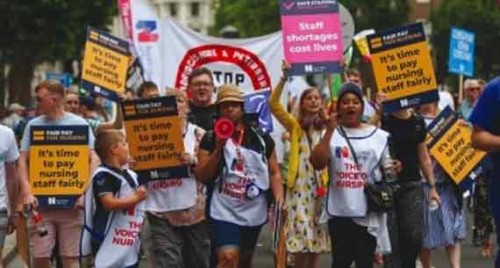united kingdom braces for Christmas disruptions as strikes extend

London, Dec 9 (IANS) The wave of union strikes that has hit the UK since early December appears to continue unabated, and the labour actions now also threaten traffic at the country's airports and railway stations, with public discontent on the rise as the holiday season is nearing.
Border Force workers at locations in England, Scotland and Wales, including the country's biggest airport Heathrow, plan to go on strike for eight days in December, the Public and Commercial Services Union (PCS) said on Wednesday.
The industrial action comes after 100,000 PCS members in government departments and other public bodies voted to walk out demanding a 10 per cent pay rise, pensions justice and job security, reports Xinhua news agency.
"Like so many workers, our members are struggling with the cost-of-living crisis. They are desperate," PCS General Secretary Mark Serwotka said.
Home Secretary Suella Braverman on Thursday urged people who plan to travel abroad to "think carefully" because they may well be impacted.
The National Union of Rail, Maritime and Transport Workers (RMT) also announced on Wednesday that an industrial action by more than 40,000 railway workers throughout December, including the Christmas holidays, will go ahead as scheduled.
On Sunday, the RMT rejected a 4 per cent pay rise offer in 2022 and 2023 from the Rail Delivery Group (RDG), which represents 14 train companies, noting that the offer was conditional on RMT members accepting significant changes to working practices and huge job losses.
"We have rejected this offer as it does not meet any of our criteria for securing a settlement on long-term job security, a decent pay rise and protecting working conditions," RMT General Secretary Mick Lynch said.
The union said a resolution to the dispute is now further away. The RDG has urged passengers to plan journeys in advance and only travel by train if necessary during the strikes.
Simultaneously, more than 10,000 ambulance workers have also decided to go on strike across England and Wales later this month.
"Demoralised and downtrodden, they've faced 12 years of Conservative cuts to the service and their pay packets, fought on the frontline of a global pandemic and now face the worst cost-of-living crisis in a generation," Rachel Harrison, national secretary at the GMB union, said.
One in eight UK businesses was affected by industrial action in October, the Office for National Statistics (ONS) said in early December.
More than a quarter of those businesses said they were unable to obtain necessary goods for their business.
The walkouts have taken a huge economic toll and have had a huge impact on day-to-day life. Economists have assessed that the first wave of rail strikes alone, in June 2022, cost the UK economy nearly 100 million pounds ($122 million), according to a government report.
The rail strikes impacting the Christmas weekend "will be hugely damaging for hospitality businesses, their workers and their customers as it seems almost guaranteed that we will be facing a heavily disrupted Christmas for the third year in a row", UKHospitality Chief Executive Kate Nicholls commented.
Nicholls estimated that the cost of these strikes already stood at 1.5 billion pounds in lost sales. "It's incredibly frustrating that a solution has yet to be reached to avoid this disruption during the golden month of trade for our sector," she said.
In early December, YouGov found that the public's perception of the country's trade unions had turned markedly negative since June.
"Britons are now more likely to say they think trade unions can take strike action too easily and that there should be more restrictions on them," the survey showed.

|

|

